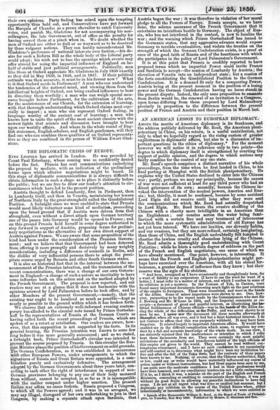THE DIPLOMATIC CRISIS OF EUROPE.
KING LEoroen has arrived in London. He was preceded by Count Paul Esterhazy, whose coming was so confidently denied before the fact. Prussia has sent communications embodying the proposal to mediate, with an indication of the preliminary terms upon which ulterior negotiations might be based. In this stage of diplomatic communications it is always difficult to obtain information in such a shape as to place it distinctly before•the public ; but we are free to draw our reader's attention to cir-
cumstances which have led to the present position. • Austria thought to defend Lombardy, first in Piedmont, then in Lombardy itself, and then in Venetia, maintaining her tenure of Northern Italy by the great stronghold called the Quadrilateral Position. A fortnight since we were enabled to state thaerrnssia would most likely volunteer some kind of mediation, proceeding upon the broad ground that if Austria were driven from that stronghold, even without a direct attack upon German territory one of the passes into Germany would be opened to France; and on this ground Prussia held herself in some degree authorized to Step forward in support of Austria, proposing terms for prelimi- nary negotiations as the alternative of her own direct support of Austria against France. We are aware that some proposition of the kind had been under the consideration of the Prussian Govern- ment; and we believe that that Government had been deterred from offering it more promptly and decisively by many weighty considerations, including a difference of councils in Berlin, and the dislike of very influential persons there to adopt the preci- pitate course urged by Bavaria and other South German states. It is also an historical fact that in the interval between the an- nouncement of the Prussian intention, and the transmission of the recent communications, there was a change of our own Govern- ment in England—a change of such a nature as inevitably to have some influence both on the action and. on the method adopted by the French Government. The proposal is now reported, and our readers may see at a glance that it does not harmonize with the opinions avowed by Lord Palmerston before he took office, and by other Members of the present Government,—namely, that the existing war ought to be localized as much as possible—kept as nearly as possible to the ground within which it has broken forth.
We observe that an extremely well-informed evening contem- porary has alluded to the circular note issued by Prince Gortscha- koff to the representatives of Russia at the German Courts as having called forth the recent proceedings of Prussia, which are spoken of as a retort or retaliation. Our readers are aware, how- ever, that this supposition is not supported by the facts. In its general bearing, the Prussian intention was known to some few long before it was more generally announced ; and as we stated, a fortnight back, Prince Gortschakoff's circular was intended to prevent the course proposed by Prussia. In this circular the Rus- sian Minister places the position of his Government on solid grounds. The German Confederation, as it was established in concurrence with other European Powers, under arrangements to which the signatures of Russia and Great Britain were appended, is a com- bination purely and exclusively defensive. The arrangement adopted by the German Governments about three years later, con- ceding to eaoh other the right of interference in support of non- German provinces belonging to any one of their body menaced from without, cannot be accepted, in so far as it is incompatible with the earlier compact under higher sanction. The present Italian war offers no casus fcederis. Russia proposed a Congress, to which all the Powers agreed; and it was in an arrogant, we may say illegal, disregard of her own undertaking to join in that Congress, by making a separate attack upon Sardinia, that
Austria began the war ; it was therefore in violation of her moral pledge to all the Powers of Europe. Russia accepts, as we have done, the solemn assurance of the French Government that it entertains no intentions hostile to Germany. The object of Rus- sia, who has not interfered in the contest, is now to localize the war ; and the warning which Prince Gortschakoff has issued to the Germanic states, that any aggressive advance would expose Germany to terrible eventualities, and violate the treaties on the strength of which the German Confederation exists, is a proof at once of the good faith of Russia and of the heartiness with which she participates in the policy of Lord Palmerston's Government. It is at this point that Prussia is credibly reported to have proposed terms which no impartial Power could invite France and Sardinia to accept—the cession of Lombardy by Austria; the elevation of Venetia into an independent state ; but a cession of the forts constituting the Quadrilateral Position to the German Confederation. It is a demand fit only for a conquering Power, Austria being at the present moment in the position of a losing power and the German Confederation having no locus standi in the present dispute. Indeed, the only sane proposition to emanate from Berlin would be, the renewal of an invitation to a Congress, upon terms differing from those proposed by Lord Malmesbury precisely in proportion to the difference between the present position of France and Austria and their position in March last.
























 Previous page
Previous page